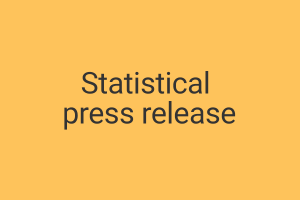The Travel Survey for Northern Ireland In-depth Report 2021 has been published today
Date published:
The Travel Survey for Northern Ireland (TSNI) In-depth Report, containing statistics for 2021, is now available. The publication is produced by the Analysis, Statistics and Research Branch (ASRB) of the Department for Infrastructure and contains information on a variety of travel modes including walking, cycling, public transport, cars, a variety of journey purposes including travelling to work and shopping and key tables by urban–rural.

The publication is available on the Travel Survey for Northern Ireland website.
Key Points
The key points for 2021 are:
- Each person travelled, on average, 4,940 miles in 2021 (approximately 13.5 miles per day), no real change from 2020 (4,550 miles per person).
- On average, 838 journeys were made per person in 2021 (just over two journeys per day), around the same as 2020 (826 journeys per person).
- In 2021, the average time each person spent travelling was 291 hours (approximately 48 minutes per day), similar to 2020 (279 hours per person).
- On average, in 2021, people living in urban areas made around the same number of journeys as people living in rural areas (urban: 840 journeys; rural: 836 journeys). However, rural residents travelled further (urban: 3,967 miles; rural: 6,292 miles) and spent more time travelling than urban residents (urban: 274 hours; rural: 314 hours).
- In 2021, 69% of all journeys were made by car, 24% by walking and 2% by public transport (Ulsterbus, Metro, Other Bus, Northern Ireland Railways, Black Taxi), similar to 2020.
- More than one third (36%) of all journeys were less than two miles long in 2021. Half (50%) of these journeys were on foot and a similar proportion (47%) were by car. The car was the dominant mode of transport (82%) for journeys of two miles and over.
- In 2021, nearly two fifths (39%) of all journeys were made for leisure and other purposes (visiting friends, entertainment, social activities, sports activities, holiday, day trips, just walking, other), 18% for shopping and 17% for commuting and business, no real change from 2020.
- Just over three quarters (76%) of all respondents took a walk lasting at least 20 minutes once a week or more.
- In 2021, 15% of all respondents cycled once a week or more.
- Around five times as many respondents travelled on the bus once a week or more (11%) as travelled on the train once a week or more (2%).
Notes to editors:
1. Background to TSNI 2021 In-depth Report
The Travel Survey for Northern Ireland (TSNI) is a household survey and is the only source of information on how, over the region as a whole, people use different forms of transport to meet their travel needs as individuals. Detailed user information, definitions and guidance are included in the report.
TSNI reports are published annually and the earliest data available are for the 1999-2001 period. This is the second of the two reports to be published covering the 2021 reporting period. A headline report (containing key figures) was published in March 2023. This in-depth report contains more detailed analysis on journeys taken by a representative sample of the population in 2021 (including breakdowns by age and by gender).
2. Changes to the survey from 2020
There were a number of significant changes to the survey methodology from April 2020 in response to the COVID-19 pandemic to ensure the data could continue to be collected safely. This included moving from face-to-face to telephone interviewing.
Due to these changes to the methodology, the 2020 and 2021 survey estimates are being reported as single years instead of the usual three years combined and these results are not directly comparable to those of previous years. The commentary contained in the report is therefore mainly focussed on the findings for 2021 and any comparisons are only made with 2020 data. The smaller achieved sample for single years has limited some of the analysis that can be carried out.
3. Accredited Official Statistics
These statistics are accredited official statistics. Accredited Official Statistics are official statistics that have been independently reviewed by Office for Statistics Regulation (OSR) and confirmed to comply with the standards of trustworthiness, quality and value in the Code of Practice for Statistics. Accredited official statistics are called National Statistics in the Statistics and Registration Service Act 2007.
4. Additional Information
For more information relating to this publication, including alternative formats, please contact:
Analysis, Statistics and Research Branch,Room 5.25,
Clarence Court,
10 - 18 Adelaide Street,
Town Parks
BELFAST, BT2 8GB
- Telephone: (028) 9054 0799
- E-mail: asrb@nisra.gov.uk
- Website: www.infrastructure-ni.gov.uk/topics/dfi-statistics-and-research
- All media queries should be directed to the Department for Infrastructure Press Office at: press.office@infrastructure-ni.gov.uk
- The Executive Information Service operates an out of hours service for media enquiries only between 1800hrs and 0800hrs Monday to Friday and at weekends and public holidays. The duty press officer can be contacted on 028 9037 8110.
- Follow the Department on Twitter @deptinfra on Facebook @DepartmentforInfrastructure and on LinkedIn at DfILinkedIn